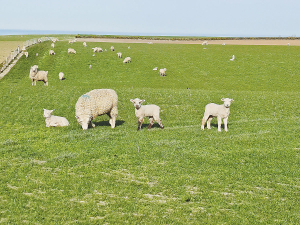Hawke’s Bay sheep and beef farmers warned to monitor stock water wells
Sheep and beef farmers in Hawke's Bay are being urged to keep a close eye on the wells that supply water to their stock.
 Expected dry weather along the east coast of both islands builds a strong case for weaning at least a proportion of the lamb crop early.
Expected dry weather along the east coast of both islands builds a strong case for weaning at least a proportion of the lamb crop early.
A predicted dry summer, thanks to El Nino weather patterns, may make weaning a proportion of the lamb crop a good option this season.
The prospect of hot, dry weather along the east coast of both islands builds a strong case for weaning at least a proportion of the lamb crop early. This will allow high-quality feed to be partitioned into lambs while ewes recover body condition. It also provides the opportunity to sell cull ewes early.
Trials run at Massey University found lambs over 20kg LW coped best with early weaning (minimum weaning weight was 16kg LW). However, it was the quality of the forages on offer that was the greatest determinant of how well lambs grew post-weaning.
Professor Paul Kenyon, who led the early-weaning trials, says early weaned lambs should be given unrestricted access to legumebased forages such as a herb clover mix at a minimum cover of seven centimetres in height.
If lambs are weaned onto the crop, they should be given time to adjust to a change in feed. Running the ewe and lambs onto the crop a few days before weaning, then running the lambs back onto the crop after weaning will help minimise the weaning check.
He says in late lactation all lambs, but especially multiples, are receiving very little nutrition from the ewe, so when grass-growth is limited the ewes are competing with their lambs for feed, compromising the performance of both.
Early weaning can also be particularly useful in hoggets as it will give them more time to recover body condition between lambing and mating again as a two-tooth.
Partitioning high quality feed into lambs in the late spring early summer period will benefit the whole farm system. It means more lambs can be sold prime before the height of summermaking more feed available for capital stock – and ewe lambs can be grown out to heavier weights early. This means there is flexibility to hold them back later when feed resources are more limited.
Pāmu has welcomed ten new apprentices into its 2026 intake, marking the second year of a scheme designed to equip the next generation of farmers with the skills, knowledge, and experience needed for a thriving career in agriculture.
One team with 43 head, including a contingent from Mid Canterbury, are reflecting on a stellar NZ DairyEvent.
Fonterra farmer shareholders have approved the mechanism for a $2/share capital return expected from the sale of its global consumer and associated businesses.
Trainees in the horticulture industry studying towards a certificate or diploma can now apply for Horticulture New Zealand's (HortNZ) 2026 Industry Training Scholarships programme.
OPINION: The first three Global Dairy Trade (GDT) auctions have been a morale booster for farmers.
Former Fonterra executive Alex Turnbull has been appointed CEO to lead all five Yili Oceania Business Division companies in New Zealand.

OPINION: Here w go: the election date is set for November 7 and the politicians are out of the gate…
OPINION: ECan data was released a few days ago showing Canterbury farmers have made “giant strides on environmental performance”.